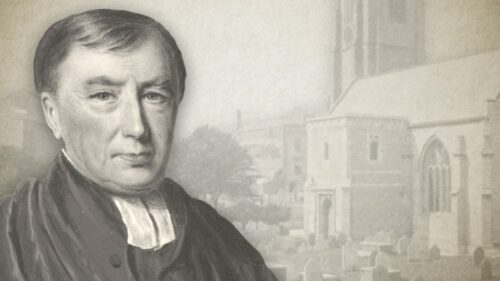
October 4—Morning Devotion
“Behold, I am with thee, and will keep thee in all places whither thou goest; for I will not leave thee, until I have done that which I have spoken to thee of.”—Genesis 28:15
Here is a promise to Jacob, and not to Jacob only, personally considered, but to Jacob’s seed. For the apostle Paul was commissioned by the Holy Ghost to tell the church of Jesus, that we, as Isaac was, are the children of promise. Hence this, like all other promises in Christ Jesus, is yea and amen. Pause, then, my soul, and ask thyself what hath the Lord spoken to thee of? Hath he met with thee in Bethel, as he found Jacob? And hath he there spoken unto thee? How wilt thou know? Very plainly. Jesus hath met with thee, hath indeed spoken unto thee, if so be thou hast seen thine own unworthiness and sinfulness by nature and by practice; and if thou hast seen the King in his beauty, even Jesus in his own glory, suitableness, and all-sufficiency, as a Saviour; and inclined thine heart by his grace to believe in him, to depend upon him, and to live to him and his glory. What sayest thou, my soul, to these things? Is this promise made to Jacob and his seed thine? If so, live upon Jesus, and plead the fulfilment of it daily, hourly. Say to him, my soul, Lord, what hast thou spoken to me of, but mercy, pardon, peace, and grace, with all spiritual blessings in Christ Jesus? And what have I to depend upon, or what indeed can I need more, but thy promise and the great Promiser? Yes, Lord Jesus, I do depend, I do believe. Surely thou wilt never leave whom thou hast once loved; and therefore thou wilt not leave me, until thou hast done that which thou hast spoken of in grace here, and wilt complete in glory hereafter.
Robert Hawker (1753-1827) was an Anglican (High-Calvinist) preacher who served as Vicar of Charles Church, Plymouth. John Hazelton wrote of him:
“The prominent features…in Robert Hawker's testimony…was the Person of Christ….Dr. Hawker delighted to speak of his Lord as "My most glorious Christ.” What anxious heart but finds at times in the perusal of the doctor's writings a measure of relief, a softening, and a mellowing? an almost imperceptible yet secret and constraining power in leading out of self and off from the misery and bondage of the flesh into a contemplation of the Person and preciousness of Christ as "the chiefest among ten thousand and the altogether lovely." Christ and Him crucified was emphatically the burden of his song and the keynote of his ministry. He preached his last sermon in Charles Church on March 18th, 1827, and on April 6th he died, after being six years curate and forty-three years vicar of the parish. On the last day of his life he repeated a part of Ephesians 1, from the 6th to the 12th verses, and as he proceeded he enlarged on the verses, but dwelt more fully on these words: "To the praise of His glory Who first trusted in Christ." He paused and asked, "Who first trusted in Christ?" And then made this answer: "It was God the Father Who first trusted in Christ."
Robert Hawker on the Biblical Covenants (Complete)
Robert Hawker's Poor Man's Morning Portions





